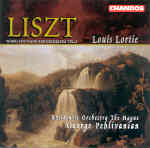Looking for Liszt Concertos whose dynamic range is restricted within a sonic field that doesn’t consistently clarify the orchestration? Or, for a soloist whose dutiful note perfection sidesteps the composer’s rhetorical syntax and risky bravura? Well then, this disc’s for you. On occasion, to be sure, Louis Lortie bursts his bubble of inhibition when he plays alone, such as in the E-flat Concerto’s opening cadenza and the lyrical passages contained in the second section’s L’istesso Tempo. But these are scintillating blips on a screen of blandness. In the same concerto you’ll search in vain for the dazzling payoff both Richter/Kondrashin and Argerich/Abbado achieve during the concluding Allegretto Vivace section.
Now turn to the A major concerto. Compare any specific portion of Lortie’s recording with Thibaudet, Berman, Katchen, Richter, or even Leslie Howard. Lortie invariably proves less engaged with what he’s doing, and consequently he’s less interesting, more matter-of-fact. Lortie, for instance, imparts no trace of urgency and line in the slurred passages from measure 513 on, and the glissandos have none of Richter’s thunderous thrust.
As for Jay Rosenblatt’s reconstruction of the Liszt Third Concerto, the Steven Mayer/Tamas Vasary traversal on ASV has more vibrancy and textural variety than Lortie/Pehlivanian. You also wish that the Concerto Pathetique’s meditative, lyrical sections were projected with more assertiveness and inner urgency, although Lortie’s fast octave playing and bass register rumbles are right on the money. In sum, the third installment of Chandos’ cycle devoted to Franz Liszt’s works for piano and orchestra lives up to the lackluster standards of its predecessors.
































